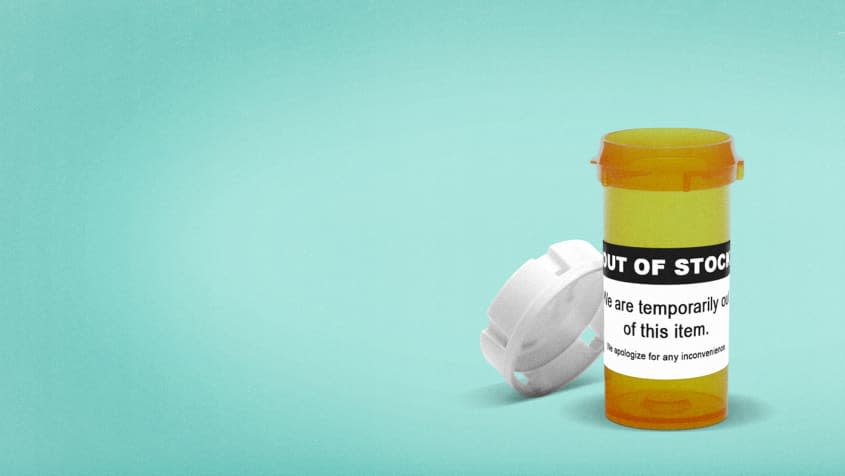Why is America running short of cancer drugs?

Cancer is always a crisis. And lately, that crisis has been compounded by a shortage of two chemotherapy drugs, The New York Times reported. A shortfall of carboplatin and cisplatin is "forcing patients and their doctors to face even grimmer realities than those cancer typically presents." And there are few signs the shortage will end anytime soon. "Some companies that sell the medications are projecting that the shortage will last through the fall or later."
What's causing the shortage? The Washington Post reported the problem originated at a plant in India that was producing half of America's supply of cisplatin. It suspended production after a November inspection by the U.S. Food and Drug Administration turned up a "cascade of failure" in quality control. The pandemic revealed the fragility of the world's supply lines, and this is just the latest case. "A disruption at a single plant can trigger widespread shortages when other manufacturers can't make up the difference."
The shortage is "forcing thousands of patients to miss life-saving treatments," the Financial Times reported. Hospitals are delaying treatments in some cases and using substitute drugs in others. "Are we potentially in some way reducing the chance for cure?" asked Julie Gralow at the American Society of Clinical Oncology. "I don't think we have solid data on that, but that is a serious concern." Why is America facing a cancer drug shortage? And what can be done about it?
What are commentators saying?
"Cancer drugs are not scarce for the same reasons that yeast, toilet paper or couches were," Ed Yong wrote at The Atlantic. The problem isn't a pandemic or a ship stuck in a canal but because the overall market for generic pharmaceuticals is "utterly dysfunctional." Generic drugs are sold cheaply, but cancer drugs are hard to make, and doing so safely usually isn't cheap. The low margins on such drugs have pushed some manufacturers out of the market, leaving a few at-capacity factories to shoulder the load. When problems arise, then, they cascade quickly. "Any disruption to production has severe consequences."
The problem is rooted in America's overreliance on foreign suppliers, Tinglong Dai and Christopher S. Tang wrote for Barron's. "Either we take steps to phase out our reliance on foreign manufacturers, or the FDA needs to step up its quality inspections." Nearly 3,000 foreign factories provide most of America's pharmaceuticals, but the FDA inspected just 6% of them in 2022. That means crises like the cancer drug shortage are always lurking. "This is a glaring failure hidden in plain sight."
"Cancer drug shortages should have patients rioting in the streets," Kristen Rice, a San Diego oncologist, wrote for STAT News. There are no "silver bullet" solutions to the shortage, but it's clear that the economics of drug manufacturing are "broken." Policymakers should put "everything on the table," including tax breaks for generic drug makers and other measures to "boost manufacturer competition and strengthen supply chains." The effort will require buy-in from both the public and private sectors. "Cancer patients' lives depend on it."
What's next
Policymakers are looking for both short-term and long-term fixes. The New York Times reported that the FDA has responded to the shortage by allowing temporary imports of cisplatin from Qilo Pharmaceutical, a Chinese drug manufacturer, and that distribution of the drug started in early June. One Florida doctor said the new shipments are not enough to fully meet the need. "It's about six days of treatment for us," he said.
Congress is also looking to intervene. The Hill reported that a House health subcommittee held a hearing on the issue in mid-June. Recommendations included incentivizing new manufacturing technology and reforming the U.S. Strategic National Stockpile. "Today's shortages are the worst that I've seen in my 30-year career," Gralow told the committee.
Meanwhile, ABC News reported, Sens. Gary Peters (D-Mich.) and Joni Ernst (R-Iowa) have introduced legislation that would require federal agencies to assess vulnerabilities in the drug supply chain and offer proposed reforms. That, Peters said, should reduce how American "overreliance on foreign nations for critical drugs threatens our military readiness and creates health risks for Americans."
You may also like
What happens if Republicans accept that Trump is guilty?
South Koreans suddenly become younger thanks to new 'international age' law
Scientists find evidence of gravitational waves warping space-time throughout the cosmos

